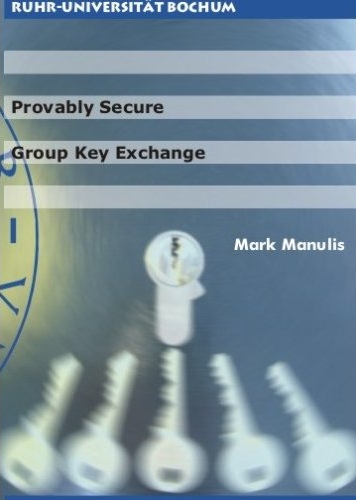The rapid and promising development of applications and communication systems designed for
groups of participants like groupware, computer supported collaborative work systems, or digital
conference systems implies exigence of mechanisms providing adequate security properties.
These mechanisms can be designed based on the foundations of cryptography.
Group key exchange protocols are multi-party cryptographic protocols those participants compute a shared secret key that can then be used in conjunction with other cryptographic constructions like encryption schemes and message authentication codes for the purpose of privacy, confidentiality and authentication.
Security confidence of modern cryptographic constructions can be increased via adequate security proofs. The paradigm of provable security gains in importance for all kinds of cryptographic constructions, including group key exchange protocols those security issues represent the scope of this dissertation.
We give an analytical overview of the state-of-the-art research in this area and identify strengths and weaknesses of many previous approaches. We suggest a new approach in form of a security model those stronger definitions provide background for more confident security analyzes and proofs. Additionally, we present a number of generic solutions (compilers) that can be applied to independently designed group key exchange protocols in order to enhance security thereof with respect to various goals considered by our security model. Finally, we present a concrete group key exchange protocol that provably satisfies the apparently strongest currently available formally specified security requirements.
Group key exchange protocols are multi-party cryptographic protocols those participants compute a shared secret key that can then be used in conjunction with other cryptographic constructions like encryption schemes and message authentication codes for the purpose of privacy, confidentiality and authentication.
Security confidence of modern cryptographic constructions can be increased via adequate security proofs. The paradigm of provable security gains in importance for all kinds of cryptographic constructions, including group key exchange protocols those security issues represent the scope of this dissertation.
We give an analytical overview of the state-of-the-art research in this area and identify strengths and weaknesses of many previous approaches. We suggest a new approach in form of a security model those stronger definitions provide background for more confident security analyzes and proofs. Additionally, we present a number of generic solutions (compilers) that can be applied to independently designed group key exchange protocols in order to enhance security thereof with respect to various goals considered by our security model. Finally, we present a concrete group key exchange protocol that provably satisfies the apparently strongest currently available formally specified security requirements.
 Mark Manulis: Provably Secure Group Key Exchange
Mark Manulis: Provably Secure Group Key ExchangeEditors: Christof Paar, Ahmad-Reza Sadeghi, Jörg Schwenk
Series: IT Security
Volume: 5
Publisher: Europäischer Universitätsverlag
Date: 08/08/2007
ISBN: 978-3-89966-275-7
232 pages, english, paperback, 21x15 cm, 24.90 €
-
in USA The University Press Bochum, c/o Ms Lei Song, 2504 Grant Ave #2, Redondo Beach CA 90278 USA,
phone +1 310 379-9031, fax +1 209 729-5412, email us@bou.de
-
in Europe The University Press Bochum, Querenburger Höhe 281, 44801 Bochum, Germany,
phone +49 234 971 978-0, fax -6, email bou@bou.de
-
in Asia The University Press Bochum, c/o Ms Sylvia Xinghua WENG, 225 Chaoyang Beilu, Jinglong dasha, 1809 shi,
100026 Beijing, phone +86 10 8595-2711, fax -2712, email china@bou.de
-
via Amazon
- 01/12/2003 Start at Network and Data Security Group, Ruhr University Bochum, under supervision of Prof. Jörg Schwenk
- 07/02/2007 Submission to the Dept. of Electrical Engineering and Information Technology, Ruhr University Bochum
- 26/06/2007 Defence (with summa cum laude)
Referees
- Jörg Schwenk, Prof. (Head of Network and Data Security Group, Ruhr University Bochum, supervisor)
- David Pointcheval, Prof. (Head of Crypto Team, Ecole Normale Supérieure Paris)
- Heinz G. Göckler, Prof. (Head of Digital Signal Processing Group, Ruhr University Bochum, chair)
- Jörg Schwenk, Prof. (Head of Network and Data Security Group, Ruhr University Bochum, supervisor)
- David Pointcheval, Prof. (Head of Crypto Team, Ecole Normale Supérieure Paris)
- Ahmad-Reza Sadeghi, Prof. (Head of System Security Group, Ruhr University Bochum)
- Thomas Herrmann, Prof. (Head of Information and Technology Management Department, Ruhr University Bochum)